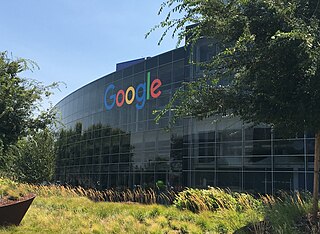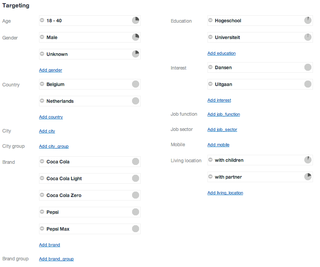
AOL is an American web portal and online service provider based in New York City. It is a brand marketed by the current incarnation of Yahoo! Inc.
Affiliate marketing is a marketing arrangement in which affiliates receive a commission for each visit, signup or sale they generate for a merchant. This arrangement allows businesses to outsource part of the sales process. It is a form of performance-based marketing where the commission acts as an incentive for the affiliate; this commission is usually a percentage of the price of the product being sold, but can also be a flat rate per referral.
Google AdSense is a program run by Google through which website publishers in the Google Network of content sites serve text, images, video, or interactive media advertisements that are targeted to the site content and audience. These advertisements are administered, sorted, and maintained by Google. They can generate revenue on either a per-click or per-impression basis. Google beta-tested a cost-per-action service, but discontinued it in October 2008 in favor of a DoubleClick offering. In Q1 2014, Google earned US$3.4 billion, or 22% of total revenue, through Google AdSense. AdSense is a participant in the AdChoices program, so AdSense ads typically include the triangle-shaped AdChoices icon. This program also operates on HTTP cookies. In 2021, over 38.3 million websites use AdSense.
DoubleClick Inc. was an American advertisement company that developed and provided Internet ad serving services from 1995 until its acquisition by Google in March 2008. DoubleClick offered technology products and services that were sold primarily to advertising agencies and mass media, serving businesses like Microsoft, General Motors, Coca-Cola, Motorola, L'Oréal, Palm, Inc., Apple Inc., Visa Inc., Nike, Inc., and Carlsberg Group. The company's main product line was known as DART, which was intended to increase the purchasing efficiency of advertisers and minimize unsold inventory for publishers.
Yahoo! Native is a native "Pay per click" Internet advertising service provided by Yahoo.
Pay-per-click (PPC) is an internet advertising model used to drive traffic to websites, in which an advertiser pays a publisher when the ad is clicked.

Google LLC is an American multinational technology company focusing on artificial intelligence, online advertising, search engine technology, cloud computing, computer software, quantum computing, e-commerce, and consumer electronics. It has often been considered "the most powerful company in the world" and as one of the world's most valuable brands due to its market dominance, data collection, and technological advantages in the field of artificial intelligence. Its parent company Alphabet is often considered as one of the Big Five American information technology companies, alongside Amazon, Apple, Meta, and Microsoft.
Search engine marketing (SEM) is a form of Internet marketing that involves the promotion of websites by increasing their visibility in search engine results pages (SERPs) primarily through paid advertising. SEM may incorporate search engine optimization (SEO), which adjusts or rewrites website content and site architecture to achieve a higher ranking in search engine results pages to enhance pay per click (PPC) listings and increase the Call to action (CTA) on the website.
Contextual advertising is a form of targeted advertising for advertisements appearing on websites or other media, such as content displayed in mobile browsers. In context targeting, advertising media are controlled on the basis of the content of a website using linguistic elements. The advertisements themselves are selected and served by automated systems based on the context of what a user is looking at.
Microsoft Advertising is an online advertising platform developed by Microsoft that provides pay per click advertising on the Bing, Yahoo!, and DuckDuckGo search engines, as well as on other websites, mobile apps, and videos. In 2021, Microsoft Advertising surpassed US$10 billion in annual revenue.
Google was officially launched in 1998 by Larry Page and Sergey Brin to market Google Search, which has become the most used web-based search engine. Larry Page and Sergey Brin, students at Stanford University in California, developed a search algorithm at first known as "BackRub" in 1996, with the help of Scott Hassan and Alan Steremberg. The search engine soon proved successful and the expanding company moved several times, finally settling at Mountain View in 2003. This marked a phase of rapid growth, with the company making its initial public offering in 2004 and quickly becoming one of the world's largest media companies. The company launched Google News in 2002, Gmail in 2004, Google Maps in 2005, Google Chrome in 2008, and the social network known as Google+ in 2011, in addition to many other products. In 2015, Google became the main subsidiary of the holding company Alphabet Inc.
In Internet marketing, search advertising is a method of placing online advertisements on web pages that show results from search engine queries. Through the same search-engine advertising services, ads can also be placed on Web pages with other published content.

Targeted advertising is a form of advertising, including online advertising, that is directed towards an audience with certain traits, based on the product or person the advertiser is promoting. These traits can either be demographic with a focus on race, economic status, sex, age, generation, level of education, income level, and employment, or psychographic focused on the consumer values, personality, attitude, opinion, lifestyle and interest. This focus can also entail behavioral variables, such as browser history, purchase history, and other recent online activities. The process of algorithm targeting eliminates waste.
Adtech AG is a German–American digital marketing company that retails products to manage, serve and evaluate online advertising campaigns. The company was founded in 1998 in Frankfurt, Germany, and was acquired by web portal AOL on May 15, 2007. The company was merged into the Oath Inc. brand, as a subsidiary of Verizon Communications.

Timothy M. Armstrong is an American business executive. He was formerly the CEO of Oath Inc., then a subsidiary of Verizon Communications that served as the umbrella company of its digital content subdivisions, including AOL and Yahoo!. Previously, he was the CEO of AOL Inc. from 2009 until its purchase by Verizon in 2015.
Pulse 360, Inc is a now defunct online advertising and marketing network which was based in Getzville, New York. The company was founded in October 1999 under the name Kanoodle. The company reached over 65% of online users monthly and also at one time reached 141 million unique visitors across over 1000 websites. The ad distribution centered on highly visited national and local news sites across the United States including NBCNews.com, Comcast, Weather.com, and ABCNews.com.
Native advertising, also called sponsored content, is a type of advertising that matches the form and function of the platform upon which it appears. In many cases it functions like an advertorial, and manifests as a video, article or editorial. The word native refers to this coherence of the content with the other media that appear on the platform.
Outbrain is a web recommendation platform founded in 2006 by Co-Founder and Co-CEO Yaron Galai and Co-Founder, Chief Technology Officer and General Manager, Ori Lahav. The company is headquartered in New York City. The company generates revenue for online publishers by displaying feeds of content and ads, or boxes of links, known as chumboxes, to pages within a website or mobile platform. Advertisers pay Outbrain on a pay-per-click basis and a portion of that revenue is shared with publishers.
Yieldmo is a technology company focused on driving quality advertising. based in New York, New York. Mike Yavonditte, Rick Eaton, Teddy Jawde, and Todd Coleman founded Yieldmo in 2012. Yavonditte is the company's CEO.



